Understanding health insurance is like figuring out a complicated puzzle, where each part is essential for your well-being. As we talk about health insurance, it’s a bit like navigating through a confusing map of healthcare options. It’s really important to notice the small signs that show you might need something called gap health insurance. It’s similar to someone who’s really good at solving puzzles—just like they carefully look at each piece to complete the picture, we’re here to carefully look at the details of health insurance. Our goal is to help you see when you might need this special kind of insurance called gap health insurance. This blog post is your helpful guide, explaining the details of when and why you might need this kind of coverage. It’s like building a strong shield to protect you from unexpected medical costs.
What is Gap Health Insurance?
Gap health insurance, also known as supplemental health insurance, helps to fill the financial gaps left by your primary health insurance plan. These gaps can often come as unwelcome surprises, leaving you with unexpectedly high out-of-pocket expenses for your medical care.
5 Signs You Need Gap Health Insurance
Let’s unveil 5 unmissable signals that suggest it might be time to consider the invaluable coverage of gap health insurance. Whether you’re evaluating your existing health insurance plan or contemplating a new one, these signs serve as essential guideposts, illuminating the potential gaps that could leave you financially vulnerable in times of unexpected medical expenses.
1. Employment Transition: A Shift in Health Coverage
Life is ever-evolving, and so are our employment situations. If you find yourself transitioning between jobs or experiencing a gap in employer-sponsored health coverage, this could be a glaring indication that you need gap health insurance. The period between jobs can leave you exposed to unforeseen medical costs, making it crucial to have a bridge that ensures continuous coverage and financial protection.
2. High Deductibles and Out-of-Pocket Costs: The Financial Strain Warning
While traditional health insurance plans often come with deductibles and out-of-pocket costs, high amounts can pose a significant financial strain. If you’re grappling with substantial deductibles that could be challenging to meet in case of a medical emergency, gap health insurance can act as a financial safety net. It helps bridge the financial gap, ensuring that you’re not burdened with exorbitant expenses during times of health crises.
3. Limited Coverage for Specific Health Services: Filling in the Coverage Gaps
Health insurance plans vary in their coverage of specific services. If your existing plan has limitations or exclusions for services crucial to your health needs, such as dental, vision, or mental health services, gap health insurance becomes a valuable supplement. It addresses these coverage gaps, providing comprehensive support for a wider array of medical needs.

4. Expensive Prescription Medications: Prescription Relief through Gap Coverage
The rising costs of prescription medications can catch anyone off guard. If you find yourself in a situation where your health insurance plan doesn’t adequately cover the medications prescribed by your healthcare provider, it’s a clear sign to consider gap health insurance. This specialized coverage can assist in managing the financial burden of expensive prescriptions, ensuring you have access to the medications you need without breaking the bank.
5. Planning for Critical Illness: A Prudent Approach
In the face of life’s uncertainties, planning for critical illness becomes a prudent approach. Gap health insurance often includes critical illness coverage, offering a lump-sum benefit upon the diagnosis of specified illnesses. This financial support can prove invaluable in covering additional costs related to treatment, recovery, or lifestyle adjustments that may arise due to a critical illness.

Conclusion: Bridging the Gaps for Holistic Health Protection
Recognizing these unmissable signs serves as a proactive step towards ensuring holistic health protection. Gap health insurance acts as a vital bridge, filling in the coverage gaps that traditional health insurance plans may leave behind. By addressing employment transitions, high deductibles, limited coverage, expensive prescriptions, and planning for critical illnesses, individuals can forge a comprehensive health insurance strategy. Embracing gap health insurance as a complementary component to your existing coverage can safeguard your financial well-being, providing peace of mind in the face of unpredictable health challenges. As you navigate the intricacies of your health insurance needs, let these signs guide you towards a more robust and resilient approach to healthcare coverage. Don’t forget to talk to an insurance consultant to get personalized advice and ensure your health insurance strategy aligns perfectly with your unique needs.



